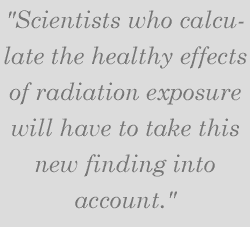Study Finds Increased Cancer Risk From Low Levels of Radiation
 On Monday April 26th the Associated Press and Reuters Health reported findings from a new study which
shows that people exposed to low levels of radiation from radon and/or repeated x-rays may be at more risk for cancer than previously thought.
On Monday April 26th the Associated Press and Reuters Health reported findings from a new study which
shows that people exposed to low levels of radiation from radon and/or repeated x-rays may be at more risk for cancer than previously thought.
A team of scientists lead by researcher Dr. Tom K. Hei, an associate professor of radiation oncology
and public health at Columbia University College of Physicians and Surgeons in New York, finished a study
which shows a new effect of cancer on cells. It had been thought that radiation only has cancer-causing
effects when it strikes the nucleus or "command center" of a cell. Dr. Hei's new study suggests that
radiation can also trigger cancer through its effects on the cell cytoplasm which is the fluid medium that fills the cell.
 When a cell nucleus is irradiated it causes damage in large sections of the DNA and usually kills the
entire cell. When Dr. Hei and colleagues irradiated the cell cytoplasm with alpha particles (the radiation
emitted by radon and its daughters) they found that the damage is smaller. Although this sounds like good
news, with fewer cells killed, there is greater risk that abnormal cells can divide and lead to cancer.
When a cell nucleus is irradiated it causes damage in large sections of the DNA and usually kills the
entire cell. When Dr. Hei and colleagues irradiated the cell cytoplasm with alpha particles (the radiation
emitted by radon and its daughters) they found that the damage is smaller. Although this sounds like good
news, with fewer cells killed, there is greater risk that abnormal cells can divide and lead to cancer.
The findings were arrived at by the use of a state-of-the-art microbeam which irradiated the cell cytoplasm
with alpha particles. After irradiating thousands of cells the scientists found that those cells hit by an
alpha particle eight times showed a mutation rate that was threefold higher than normal.
Dr. Hei concluded that, "Cytoplasmic irradiation should be considered a major concern to human health in
terms of risk exposure for cancer and birth defects, as well as having a profound impact on our understanding
of the relationships between radiation exposure and diseases."
A co-author of the study, Gerhard Randers-Pehrson, said, "Scientists who calculate the healthy effects of
radiation exposure will have to take this new finding into account." But he added that it is not yet clear
how the new research will affect the risk estimates.
The cancer risk estimates have mainly been based on the belief that mutations that can lead to cancer only
occur if the radiation particles directly hit the cell nucleus that contains the DNA. This new study may
prompt a reassessment of the risks radon has, but according to Andrew J. Grosovsky, a radiation biologist
at the University of California, "It is way too early to tell what the consequences of this new understanding will be."
